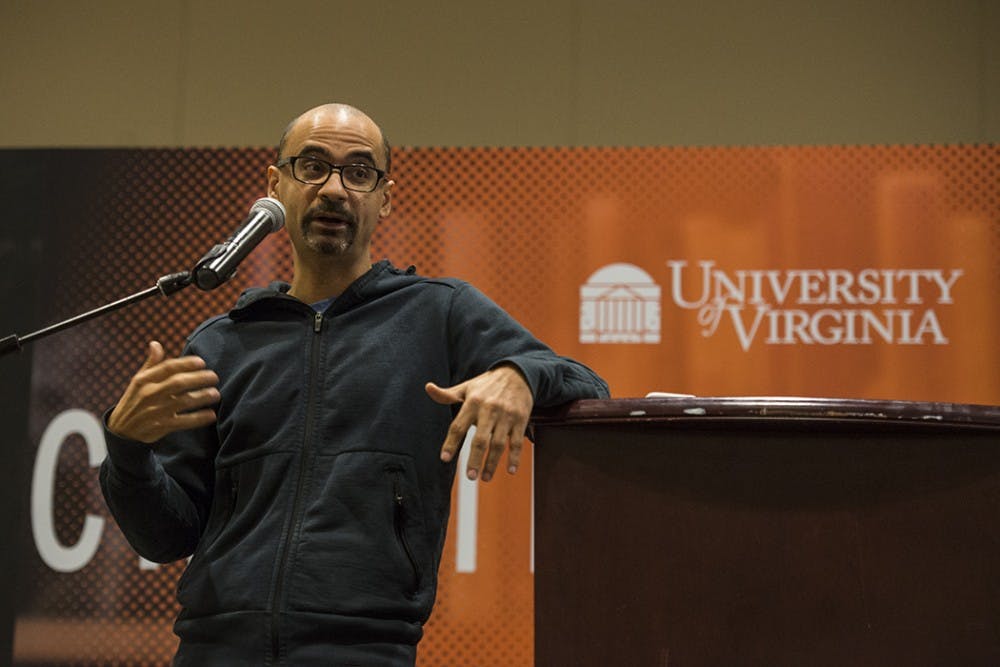“So I forgot the books,” Junot Díaz said to the packed audience of the Newcomb Ballroom shortly after walking onstage. This comment received some laughs until Díaz’s straight face made it clear he wasn’t joking. “Can someone lend me a book? I’ll take whatever book you have.”
Wednesday night, famed Dominican-American author Junot Díaz delivered a hilarious, unorthodox and gripping presentation to an audience of University students and faculty. Díaz, a recipient of several awards — most notably the Pulitzer Prize and National Book Critics Circle Award — is the latest of U.Va.’s Kapnick Writers-in-Residence. Díaz will be on Grounds through Feb. 11, during which he will visit several classes, hold a conversation and deliver a lecture.
Díaz structured the book reading in an unusual way, starting with a question and answer forum. Then, he read an excerpt from his short story collection “This is How You Lose Her,” took more questions and wrapped up with an excerpt from fan-favorite “The Brief Wondrous Life of Oscar Wao.” Both readings were short compared to the question and answer segments, the latter of which proved Díaz to be a public speaker with incredible wit, wisdom and power.
One of the first things the author did to kick off the questions and answers was get a feel for the demographics of the room.
“Anyone here from Jersey? … What about Latinos? ... Do we have any immigrants?” Díaz said.
He seemed mostly pleased with the turnout, though he added that “U.Va. could do a little more with their recruiting.”
Nearly every question directed at Díaz involved writing or art, and the author had plenty to say on both topics.
“We’re not here to make friends,” he said, referring to the role of writers. “The reality of who we are is often very difficult to tolerate … if we learn to tolerate imperfections in fiction, we can learn to tolerate ourselves.”
Díaz’s advice to aspiring undergraduate writers may seem a bit strange, when taken out of context — “F—k the writing,” he declared, before going on to explain that a college student’s responsibilities were too stressful without factoring in creative writing.
“Do the things which will always make great artists — read and live. Hey, listen — forget the writing. Take two years off from writing,” Díaz said.
He was also very candid about how his editing and writing processes differ as a minority writing about minorities.
“I’m writing literary fiction about Dominicans and [the editors] are like, ‘We’ll sell 11 copies,’” Díaz said.
Díaz also went on to say that he had still received backlash as a Dominican-American writer.
“At almost every level as a writer, I’ve encountered hostility … when you speak Spanish, so many people are automatically hostile to you,” he said.
Díaz added that he had never let this hostility stop him or even slow him down. When a student asked him how to thrive as a person of color in the current environment, he said, “There is nothing society throws at you that you cannot overcome.”
He then instructed the student to reflect on their child self, “Turn to that young person who made your present possible … you’re gonna need her to survive this.”
He also openly admitted his fear — about writing, about the political climate, about everything.
“I’m chickens—t,” Díaz said. “Everything frightens me.”
But he didn’t end his lecture on a note of fear. Instead, he left the audience with an inspiring metaphor.
“What you need to do is look downhill … some people have it much worse,” Díaz said. “When I look downhill instead of uphill, I feel solidarity. We [oppressed groups] are the majority of the planet. We are in good company … that’s been a great source of hope and faith for me.”
True to his character, he finished by saying, “I ain’t giving up. And my a— is old.”





